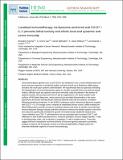Localized Immunotherapy via Liposome-Anchored Anti-CD137 + IL-2 Prevents Lethal Toxicity and Elicits Local and Systemic Antitumor Immunity
Author(s)
Kwong, Brandon; Gai, S. Annie; Elkhader, Jamal; Wittrup, Karl Dane; Irvine, Darrell J
DownloadWittrup_Localized immunotherapy.pdf (2.831Mb)
OPEN_ACCESS_POLICY
Open Access Policy
Creative Commons Attribution-Noncommercial-Share Alike
Terms of use
Metadata
Show full item recordAbstract
Immunostimulatory agonists such as anti-CD137 and interleukin (IL)-2 have elicited potent antitumor immune responses in preclinical studies, but their clinical use is limited by inflammatory toxicities that result upon systemic administration. We hypothesized that by rigorously restricting the biodistribution of immunotherapeutic agents to a locally accessible lesion and draining lymph node(s), effective local and systemic antitumor immunity could be achieved in the absence of systemic toxicity. We anchored anti-CD137 and an engineered IL-2Fc fusion protein to the surfaces of PEGylated liposomes, whose physical size permitted dissemination in the tumor parenchyma and tumor-draining lymph nodes but blocked entry into the systemic circulation following intratumoral injection. In the B16F10 melanoma model, intratumoral liposome-coupled anti-CD137 + IL-2Fc therapy cured a majority of established primary tumors while avoiding the lethal inflammatory toxicities caused by equivalent intratumoral doses of soluble immunotherapy. Immunoliposome therapy induced protective antitumor memory and elicited systemic antitumor immunity that significantly inhibited the growth of simultaneously established distal tumors. Tumor inhibition was CD8[superscript +] T-cell–dependent and was associated with increased CD8[superscript +] T-cell infiltration in both treated and distal tumors, enhanced activation of tumor antigen–specific T cells in draining lymph nodes, and a reduction in regulatory T cells in treated tumors. These data suggest that local nanoparticle-anchored delivery of immuno-agonists represents a promising strategy to improve the therapeutic window and clinical applicability of highly potent but otherwise intolerable regimens of cancer immunotherapy.
Date issued
2013-02Department
Massachusetts Institute of Technology. Department of Biological Engineering; Massachusetts Institute of Technology. Department of Chemical Engineering; Massachusetts Institute of Technology. Department of Materials Science and Engineering; Ragon Institute of MGH, MIT and Harvard; Koch Institute for Integrative Cancer Research at MITJournal
Cancer Research
Publisher
American Association for Cancer Research
Citation
Kwong, B., S. A. Gai, J. Elkhader, K. D. Wittrup, and D. J. Irvine. “Localized Immunotherapy via Liposome-Anchored Anti-CD137 + IL-2 Prevents Lethal Toxicity and Elicits Local and Systemic Antitumor Immunity.” Cancer Research 73, no. 5 (February 22, 2013): 1547–1558.
Version: Author's final manuscript
ISSN
0008-5472
1538-7445